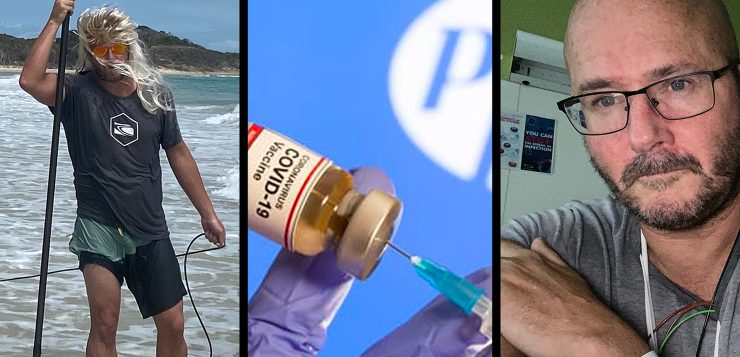Following are a series of questions New Matilda sent to the Department of Health & Ageing in early 2023, as preparation for a major series investigating the Australian Government response to the Covid-19 pandemic.
- Is the Therapeutic Goods Administration confident that the Database of Adverse Event Notifications captured the majority of adverse events related to Covid-19 vaccines? And if not, why not?
- Could the TGA estimate in percentage terms what the DAEN captures in terms of adverse events from vaccinations?
- Does the TGA believe the level of reporting in relation to Covid-19 was significantly higher than usual, and could it estimate what percentage of adverse events it believes it captured?
- Why is the DAEN primarily a voluntary system?
- How would the TGA respond to suggestions that the DAEN is poor quality data, and exists predominantly to bolster public confidence in vaccines, rather than to capture actual vaccine injury?
Direct reporting of adverse events to the TGA is only one part of adverse event reporting, and safety signal analysis systems operating in Australia. Whilst TGA receives a combination of mandatory reports from medicine sponsors and spontaneous (voluntary) reports from health professionals and consumers, in many states and territories health professionals have mandatory requirements to notify adverse events following immunisation to their public health units and these reports are also passed onto the TGA. Additionally, the AusVaxSafety program is conducting active vaccine safety surveillance of the COVID-19 vaccines in use in Australia via direct text messages to people who have received a COVID-19 vaccine www.ausvaxsafety.org.au/vaccine-safety-data/covid-19-vaccines.
The Database of Adverse Event Notifications (DAEN)- medicines contains information from reports of adverse events that the TGA has received in relation to medicines, including vaccines, used in Australia. Critically, inclusion in the DAEN does not mean that the details of the event have been confirmed, or that the event has been determined to be related to a medicine or a vaccine. In most cases the causal relationship is not certain and the adverse event could be related to other factors. For this reason, an assessment of the safety of a particular vaccine cannot be made on DAEN data alone. It is false and misleading to assume that using these data in isolation can categorically determine a vaccine’s safety. Together with Australian and international adverse event reporting data, the TGA uses a range of additional data sources to identify potential new safety signals for a vaccine including published literature, collaboration with researchers and regular communication with international regulators.
The absolute numbers of adverse events reports received by the TGA for COVID-19 vaccines is higher than that for other vaccines. However, the number of COVID-19 vaccinations given has been far higher than for other vaccines. In the 22 months until the end of 2022, approximately 64.5 million doses of COVID-19 vaccines were administered in Australia. The numbers of reports received is also a function of extensive efforts taken to promote reporting to support robust safety monitoring of the vaccines.
To 12 January 2023 about 35% of adverse events reported in DAEN-Medicines relate to vaccines and 23% relate to COVID-19 vaccines.
- Does the TGA have any response to criticisms that the vast majority of its annual funding comes from pharmaceutical companies it exists to police?
The TGA makes regulatory decisions about therapeutic goods, including vaccines, based on detailed evaluation of their risks and benefits. Scientific and clinical expertise is applied to decision-making to ensure that the benefits of a therapeutic good outweigh any risk. For several decades the costs of performing the evaluations has been recovered from the industry that markets the vaccines. Similar processes for cost recovery of evaluation and post market services for vaccines are in place in virtually all developed countries globally.
The fees and charges are set under the Australian Government Charging Framework and guidelines for cost recovery, and are prescribed in legislation. The fees and charges are reviewed annually and, following Ministerial approval, are published on the TGA website. Importantly, an application for registering a product is not valid until prescribed fees have been paid and no part of the fees is refundable even if the registration of a product is rejected by the TGA.
- Does the TGA have any response to concerns that mRNA vaccines in particular are linked to cardiac events?
- Does the TGA have any comment on why the Singaporean Government issued a warning against vigorous exercise after a Covid-19 vaccine, but Australia did not issue this advice?
The Australian Technical Advisory Group on Immunisation (ATAGI) advises the Minister for Health and Aged Care on the National Immunisation Program (NIP) and other immunisation issues. This includes clinical advice to medical practitioners and patients on how to administer and manage immunisation in clinical practice. ATAGI has developed specific guidance on myocarditis and pericarditis after COVID-19 vaccines, including advice on exercise. This guidance was produced with the Cardiac Society of Australia and New Zealand (CSANZ), the Royal Australian College of General Practitioners (RACGP), the Australian College of Rural and Remote Medicine (ACRRM), the Australasian College for Emergency Medicine (ACEM) and the Paediatric Research in Emergency Departments International Collaborative (PREDICT) www.health.gov.au/resources/publications/covid-19-vaccination-guidance-on-myocarditis-and-pericarditis-after-covid-19-vaccines?language=en.
Myocarditis and pericarditis (inflammation of the heart or membrane around the heart) are known but very rare side effects of COVID-19 vaccination. Myocarditis is reported in around 1-2 in every 100,000 people who receive Comirnaty (Pfizer) and around 2 in every 100,000 of those who receive Spikevax (Moderna). Cases are usually mild and resolve within a few days. The TGA is carefully monitoring and reviewing reports of these adverse events and publishes fortnightly updates in the COVID-19 vaccine safety report (www.tga.gov.au/news/covid-19-vaccine-safety-reports). ATAGI continues to emphasise that the protective benefits of the mRNA vaccines far outweigh the rare risk of these side effects.
- Can the TGA comment more broadly on the effectiveness of the Covid-19 vaccination campaign?
The latest figures show 89.6 per cent of the Australian population aged five years and older have had two COVID-19 vaccine doses. This figure rises to 96 per cent for Australians aged 16 years and older. Further, 72.4 per cent of the eligible population aged 16 years and older have had a third vaccine dose, providing them with additional protection.
- Can the TGA confirm what constitutes a ‘very common’, ‘common’, ‘uncommon’, ‘rare’ and ‘very rare’ event, in terms of adverse vaccine events? (e.g. Does rare equal >1,000 and <10,000).
The definition of what constitutes a ‘very common’, ‘common’, ‘uncommon’, ‘rare’ and ‘very rare’ event, in terms of vaccine adverse effects can be found in the Product Information document for each vaccine www.ebs.tga.gov.au/.
Donate To New Matilda
New Matilda is a small, independent media outlet. We survive through reader contributions, and never losing a lawsuit. If you got something from this article, giving something back helps us to continue speaking truth to power. Every little bit counts.




